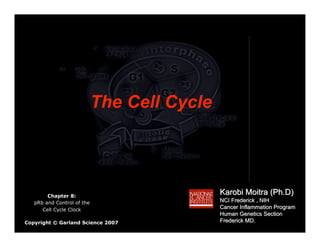
Biology of cancer lecture 5 cell cycle Karobi Moitra
- 1. The Cell Cycle Chapter 8: Karobi Moitra (Ph.D) pRb and Control of the NCI Frederick , NIH Cell Cycle Clock Cancer Inflammation Program Human Genetics Section Copyright © Garland Science 2007 Frederick MD.
- 2. The cell cycle is a programmed series of events that enables a cell to duplicate its contents and generate 2 daughter cells
- 3. The Cell Cycle Resting stage Gap2 Gap 1 Synthesis Figure 8.3b The Biology of Cancer (© Garland Science 2007)
- 4. The mitotic cell cycle in newt lung cells Anaphase: Chromosome Prophase: halves are Chromosomes pulled apart Condense (blue) Telophase: Chromatids Prophase: decondense Centrosomes and nuclear begin to assemble membrane (green) forms Metaphase: Chromosomes align and attach to spindle fibres Figure 8.3a The Biology of Cancer (© Garland Science 2007)
- 6. Checkpoint Control Checkpoint controls in the cell cycle ensure that a new step in the cycle is not undertaken until the preceding step has been completed.
- 7. Cell Cycle Checkpoints : Quality Control Figure 8.4 The Biology of Cancer (© Garland Science 2007)
- 8. What happens if a damaged cell overrides these checkpoints?
- 9. Cancer is associated with abnormal cellular proliferation Cells divide when they should not divide and they lack the normal control systems to shut off unwanted cell division
- 10. Cancer Cells May Lose Checkpoint Controls Cell death
- 11. Loss of checkpoint controls result in altered Karyotype Normal human Rad17 deprived (Rad17 prevents rereplication) Figure 8.5a The Biology of Cancer (© Garland Science 2007)
- 12. Chromosome breaks in cells Lacking ATR (ATR can stall replication to repair breaks) ATR: ataxia telangiectasia and Rad3 related protein Figure 8.5c The Biology of Cancer (© Garland Science 2007)
- 13. Once a Cell Advances beyond R- restriction point it is committed to advance through the cell cycle and divide Go to M Remain in G1 Go to G0 Figure 8.6 The Biology of Cancer (© Garland Science 2007)
- 14. Restriction Point : G1 phase checkpoint in the cell cycle of animal cells
- 15. The Cell Cycle Clock controls the cell cycle Figure 8.1 The Biology of Cancer (© Garland Science 2007)
- 16. Table 8.4 The Biology of Cancer (© Garland Science 2007)
- 17. Each cyclin pairs with a specific cyclin dependent kinase (CDK) to carry out the steps in the cell cycle Figure 8.8 The Biology of Cancer (© Garland Science 2007)
- 18. Cyclin +cyclin-dependent kinase (CDK) + CAK = active complex
- 19. Coordinated cyclin levels during the cell cycle : levels of different cyclins change at different stages in the cell cycle Figure 8.12 The Biology of Cancer (© Garland Science 2007)
- 20. Table 8.1 The Biology of Cancer (© Garland Science 2007)
- 21. Prevents damaged cells to proceed with the cell cycle and also causes interchange of CDKs at different stages of the cell cycle CDK inhibitors block the action of CDK’s at various points in the cell cycle p - designation of a tumor suppressor gene Figure 8.13a The Biology of Cancer (© Garland Science 2007)
- 22. pRB and cell cycle control
- 23. The E2F transcription factor
- 24. Transcription factors can turn genes ‘on’
- 25. E2F is a transcription factor which can switch on genes that can cause cell division. Rb can inactivate E2F.
- 26. Mutations inactivate pRb, p16 (TSG’s) & the abnormal cell replicates
- 27. How can knowledge of the cell cycle can be utilized to develop anticancer drugs?
- 28. The cell cycle is a programmed series of events that enables a cell to duplicate its contents and generate 2 daughter cells Checkpoint controls in the cell cycle ensure that a new step in the cycle is not undertaken until the preceding step has been completed. Many types of cancer cells have inactivated one or more of these checkpoint controls to propel neoplastic growth.
